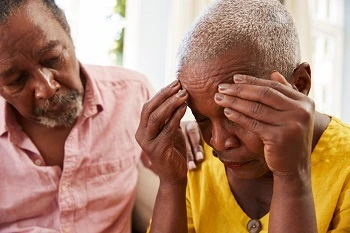Author's details
- Dr. Khashau Eleburuike
- MBBS (Ilorin) MSc. Global Health Karolinska Institute.
- Resident doctor in family medicine in Northern Sweden.
Reviewer's details
- Dr Abdulgafar Lekan Olawumi
- MBBS, MHE, MPH, FWACP
- FMCFM Department of Family Medicine and Geriatric Centre of Aminu Kano Teaching Hospital Kano, Nigeria.

- Date Published: 2026-01-03
- Date Updated: 2025-04-19
Alzheimer’s Disease in Sub-Saharan Africa
Key Messages
- Alzheimer’s disease is a medical condition that causes memory loss that is not a normal part of aging.
- The disease is common in Sub-Saharan Africa, but awareness and diagnosis remain low.
- Early signs include problems with choosing correct words, memory problems, confusion, and changes in mood or behavior.
- There is no cure, but treatment and supportive care can help manage symptoms.
- Family and community support are essential for caring for people with Alzheimer’s, especially where formal services are limited.
What is Alzheimer’s Disease?
Alzheimer’s disease is a brain disorder that slowly destroys memory, thinking skills, and the ability to carry out everyday tasks. It is the most common cause of dementia, a general term for memory loss and mental decline that interferes with daily life.
Alzheimer’s disease is becoming more common in Sub-Saharan Africa as people live longer. However, awareness remains low, and many people may mistake the symptoms for “normal ageing” or spiritual causes.
Key Points:
- Alzheimer’s is not a normal part of ageing.
- It is a medical condition that needs care and support.
- Many people with dementia in the region go undiagnosed.
- There are limited specialized services for older adults in most African countries.
Watch out for these warning signs:
- Forgetting recently learned information
- Trouble remembering names or familiar faces
- Difficulty performing everyday tasks (e.g., cooking, paying bills)
- Confusion about time or place
- Poor judgment or decision-making
- Withdrawing from social activities
- Changes in mood or personality
Doctors are still studying the exact causes of Alzheimer’s, but several factors can increase risk:
- Age (risk increases after age 65)
- Family history of dementia
- High blood pressure or diabetes
- Head injuries
- Low education levels
- Poor heart health
- Hearing problems
- Smoking
- Excessive alcohol use
- Physical inactivity
- Unhealthy diet (high sugar and saturated fat)
There is no single test for Alzheimer’s. Health workers use:
- Medical history
- Mental tests
- Brain scans (where available)
- Interviews with family members
While there is no cure, treatment can help manage symptoms:
- Medications may slow memory loss in early stages
- Supportive care, like routines and reminders, helps with daily life
- Counselling for patients and families can reduce stress.
Caring for someone with Alzheimer’s requires patience and understanding. Tips for caregivers:
- Keep a daily routine
- Use simple language and instructions
- Create a safe environment (e.g., remove sharp tools)
- Provide emotional support
- Take breaks and seek help when needed
- Join a support group for experience sharing
- Ensure good lighting to reduce confusion and prevent falls
- Label important areas like bathroom or kitchen, using large, clear signs
Family and community support is essential, especially where formal services are lacking.
- Visit your local health clinic if you notice memory problems.
- Reach out to NGOs or hospitals with geriatric services.
- Talk to community health workers or religious leaders for support and referrals.
- Look for support groups for families dealing with dementia.
REMEMBER: Alzheimer’s disease is not a curse or a punishment. It is a medical condition that deserves understanding, compassion, and proper care.
- World Health Organization. (2021). Dementia Fact Sheet. https://www.who.int/news-room/fact-sheets/detail/dementia
- Prince, M., et al. (2016). World Alzheimer Report 2016: Improving healthcare for people living with dementia. Alzheimer’s Disease International. https://www.alzint.org
- Akinyemi, R. O., et al. (2021). Dementia in Sub-Saharan Africa: Challenges and Opportunities. The Lancet Neurology, 20(5), 396–398.
- Guerchet, M., et al. (2017). Dementia in Sub-Saharan Africa: Challenges and Opportunities. Alzheimer’s & Dementia, 13(7), 701–709.
- Alzheimer’s Disease International. (2019). From Plan to Impact III: The urgent need for dementia strategies in Africa. https://www.alzint.org
